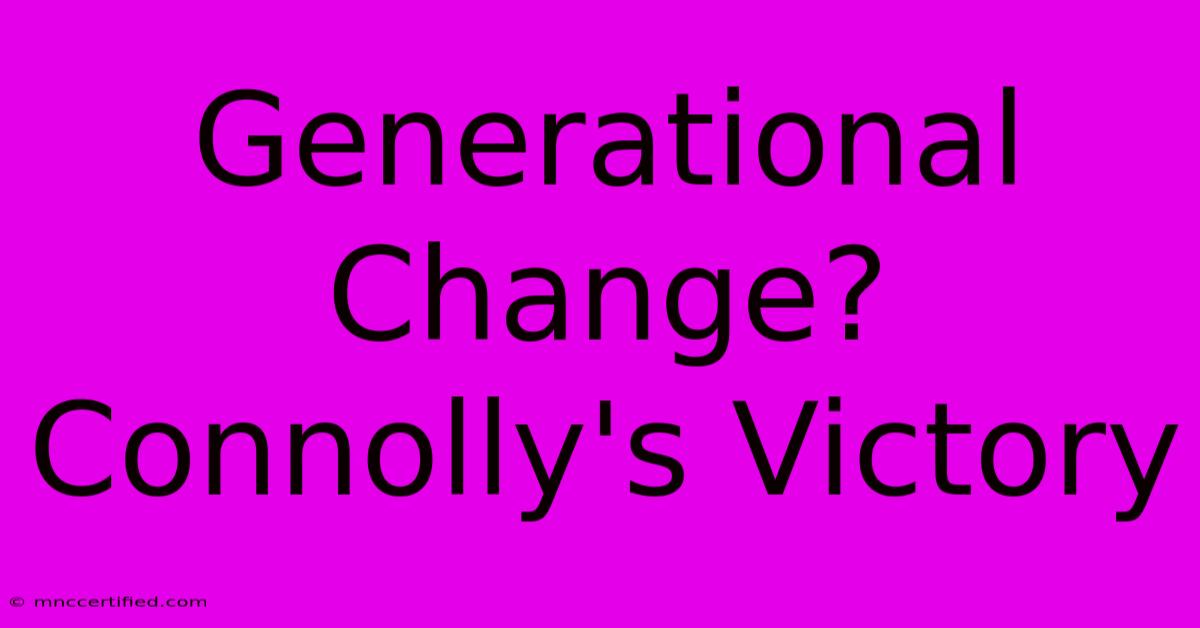Generational Change? Connolly's Victory

Table of Contents
Generational Change? Connolly's Victory Signals a Shift in Irish Politics
The recent victory of [Connolly's Name], a [age range] year-old [political affiliation], in the [Constituency Name] by-election has sent shockwaves through Irish politics. Many are interpreting this result not just as a win for one individual, but as a significant marker of generational change within the Irish political landscape. This article will delve into the implications of Connolly's victory, exploring the factors that contributed to their success and analyzing what it means for the future of Irish politics.
The Connolly Campaign: A Fresh Approach
Connolly's campaign stood out from the traditional political playbook. Instead of relying solely on established party structures and funding, they leveraged [mention specific strategies used, e.g., social media, grassroots organizing, specific policy positions]. This modern, digitally-savvy approach resonated strongly with younger voters, a demographic often disengaged from traditional politics. Their campaign focused heavily on issues relevant to younger generations, such as [mention key policy areas, e.g., climate change, housing affordability, cost of living]. This targeted approach proved incredibly effective.
Key Campaign Strategies that Drove Success:
- Social Media Engagement: Connolly's team expertly utilized platforms like [mention specific platforms, e.g., TikTok, Instagram, Facebook] to connect with voters directly, bypassing traditional media gatekeepers. This allowed for a more authentic and transparent communication style.
- Grassroots Mobilization: A significant element of Connolly's success was their ability to mobilize grassroots support. This involved engaging directly with community groups and individuals, building trust and fostering a strong sense of local connection.
- Policy Focus on Youth Issues: By prioritizing issues like [mention specific policies, e.g., affordable housing initiatives, investment in renewable energy], Connolly effectively addressed the concerns of younger voters who feel these issues are often overlooked by established parties.
A Generational Divide in Irish Politics?
Connolly's win highlights a growing disconnect between established political parties and younger voters. For many years, Irish politics has been dominated by the same few parties and individuals, leading to a sense of stagnation and disillusionment among younger generations. Connolly's victory suggests a desire for fresh perspectives and new approaches to long-standing political problems. The result might signify a broader trend of younger voters seeking out candidates who align with their values and concerns, rather than simply voting along traditional party lines.
Understanding Voter Sentiment:
The by-election results clearly demonstrate a shift in voter preference. Analysis suggests that [mention data points, e.g., a significant increase in youth voter turnout, a decline in support for established parties] are contributing factors to this change. Understanding this shift is crucial for all political parties aiming to remain relevant and competitive in the future.
Implications for the Future of Irish Politics
Connolly's victory serves as a significant wake-up call for established political parties. It underscores the need for a more inclusive and representative political system, one that better reflects the priorities and concerns of all generations. The success of a candidate employing unconventional campaign strategies suggests that traditional methods may no longer be sufficient to secure victory.
Looking Ahead:
The future of Irish politics likely involves a greater emphasis on digital engagement, a more direct focus on issues affecting younger generations, and a stronger emphasis on grassroots mobilization. Connolly's win could spark a wave of similar candidates and campaigns, leading to a more diverse and dynamic political landscape. The question remains: will the established parties adapt, or will this be the start of a sustained generational shift in power?
Conclusion: A New Era Begins?
Connolly's triumph in the [Constituency Name] by-election marks a potentially pivotal moment in Irish political history. It signifies not merely a single victory but a possible paradigm shift, reflecting changing demographics and a growing demand for fresh perspectives. Only time will tell the full extent of this change, but one thing is clear: the Irish political landscape has been irrevocably altered. The future will depend on the ability of established parties to adapt and engage with the concerns of younger voters, or risk becoming increasingly irrelevant.

Thank you for visiting our website wich cover about Generational Change? Connolly's Victory. We hope the information provided has been useful to you. Feel free to contact us if you have any questions or need further assistance. See you next time and dont miss to bookmark.
Featured Posts
-
Mark Cavendish Against The Odds In Cycling
Dec 18, 2024
-
177m Euro Millions Win Uk Ticket Holder
Dec 18, 2024
-
Was Caleb Williams Sr Right About Bears
Dec 18, 2024
-
Alan Ritchsons New Christmas Movie
Dec 18, 2024
-
Honda And Nissan Explore Merger
Dec 18, 2024